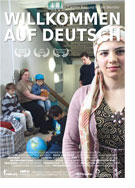

Opening 12 Mar 2015
Directed by:
Hauke Wendler
Writing credits:
Carsten Rau, Hauke Wendler
By delving into ambiguous realities, many documentaries add some clarification and make a difference. Not so here. Authorities plan to relocate 53 asylums to Appel, Germany, population 400-plus, increasing Appel’s population by one-eighth. Lacking even a quick-stop convenience shop, this is monumental, unacceptable news. Locals look for a way out. In Tespe, population 4,100, a mother of five from Chechnya is hospitalized, whereby her 21-year old daughter must maintain stability for younger brothers. Meanwhile a freshly arrived mixed-marriage Pakistani couple receives cash plus a room from local administrators. Eleven young men are subsequently lodged in Appel; Ingrid and friend Eveline compassionately assist in Tespa. Landkries (administrative district) Harburg – across the Elbe River from Hamburg – bureaucrats state their points for carrying out mandates.
Carsten Rau and Hauke Wendler wrote, directed, and produced this documentary. Technically sound, Sabine Worthmann’s music is noteworthy. Missing is: Why are so many people seeking asylum? Where can they procure necessities? Is any infrastructure offered, e.g. shopping transportation, information/instruction regarding local customs, tips from asylums already here, etcetera. Albeit good paper-pushers, district bureaucrats lack viable solutions: no government agency is shown attempting any form of assimilation. Interesting would have been juxtaposing Appel/Tespe’s problem with Western politics. Some might find this film enlightening. Anyone familiar with this state of affairs, or who has experienced the process of gaining/earning the right to live in another country, will learn nothing new. Other than seeing container accommodations are quite adequate. (Marinell Haegelin)